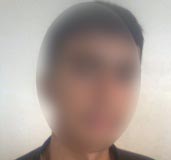Testimony: Q.A.A.
| Name: | Q.A.A. |
| Age: | 16 |
| Date of incident: | 19 April 2014 |
| Location: | Turmus’ayya, West Bank |
| Accusation: | Throwing stones |
On 19 April 2014, a 16-year-old minor from Turmus’ayya was arrested by Israeli soldiers at 6:00 p.m. while walking along Route 60. He reports being denied his basic legal rights under Israeli military law. He reports being sentenced to 5 months in prison, fined NIS 2,000 and receiving an additional suspended sentence.
 I was arrested on Route 60 near the entrance to my village. A group of Israeli soldiers were waiting there and chased me and a friend. It was around 6.00 p.m. The soldiers immediately made us sit on the ground. My hands were tied to the front with one plastic tie. The tie was painful. I was also blindfolded.
I was arrested on Route 60 near the entrance to my village. A group of Israeli soldiers were waiting there and chased me and a friend. It was around 6.00 p.m. The soldiers immediately made us sit on the ground. My hands were tied to the front with one plastic tie. The tie was painful. I was also blindfolded.They left me on the ground for about an hour before a commander came and started to question me. He asked me why I was throwing stones at cars and soldiers on the main road. I told him I didn’t throw stones at anyone and that I was going for a walk. I was then put in the back of a military jeep and sat on a seat.
The jeep drove a short distance to a nearby Israeli military base inside a settlement. I was put in a room and sat on a bench for about one hour. Then I was taken back to the jeep and put on a seat. The jeep drove for about 30 minutes before stopping at the Israeli police station inside the settlement of Binyamin. By now it was around 8.30 p.m. I was taken to a room where I waited until around 10.30 p.m. when I was interrogated.
The interrogator wore an Israeli police uniform and spoke fluent Arabic. He sat me down on a chair and removed the blindfold and the tie. He immediately started to interrogate me. He did not inform me of any rights.
The interrogator told me I was arrested because I was throwing stones near Route 60. He told me he took statements from the soldiers who arrested me and that they told him they saw me throwing stones at the road. I denied the accusation. He then told me that soldiers saw me throwing stones at a military vehicle and at a settlers’ bus. I denied the accusation. The interrogator then took me back to the waiting room. The first round of interrogation lasted for about 30 minutes.
The interrogator questioned the other boy who was arrested with me and then took me back for another round of interrogation. He repeated the same accusations except that this time he claimed that the other boy had confessed against me and told the interrogator I was with him throwing stones at the road. He then brought in the other boy to confront me but the other boy denied having confessed against me and told the interrogator we were not throwing stones. I continued to deny the accusation.
In the end the interrogator printed out my statement and asked me to sign it but I refused. The interrogator did not insist. The interrogator did not beat me or swear at me and he allowed me to use the bathroom. When the second round of interrogation was over 15 minutes later, the interrogator took me to be photographed and fingerprinted. He then took me back to the waiting room. I slept in the waiting room until around 4.30 a.m. when I was re-tied and put in a military vehicle.
The vehicle drove for about 30 minutes before stopping at Ofer prison, near Jerusalem. On arrival at Ofer I was strip searched, given prison clothes and taken to Section 13 where I was put with other minors.
On 21 April 2014, a soldier took me to the military court at Ofer. A lawyer was in court and so was my mother. I was allowed to speak to my mother across the court room. The hearing was adjourned for a week. I had more than 10 military court hearings.
In the end I accepted a plea bargain where I confessed to throwing stones at soldiers on one occasion. I was sentenced to five months in prison and fined NIS 2,000. I was also given a suspended sentence of 18 months valid for five years. In prison I was allowed to study Arabic and English and my parents visited me regularly. I was released from Ofer on 21 September 2014, and I went home with my parents.





